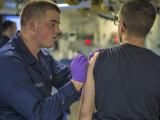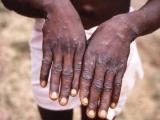Sep 25, 2002 (CIDRAP News) – Anyone who may have been exposed to smallpox should be vaccinated against the disease, regardless of contraindications such as eczema or HIV infection, according to the mass-vaccination guide released this week by federal health officials.
The "Smallpox Vaccination Clinic Guide" says that for potentially exposed people, the danger of the disease itself outweighs the risk of serious vaccine-related complications, such as eczema vaccinatum or progressive vaccinia. The guide was prepared by the Centers for Disease Control and Prevention (CDC) to help state and local health departments prepare to vaccinate the entire population within 10 days if smallpox reappears.
"In an outbreak emergency, everyone who has been in contact with a person with smallpox or was exposed to the virus is recommended to receive the one-dose vaccine, regardless of his or her age, allergies, pregnancy, or medical conditions," the guide states.
Patient-information material in the guide does not describe vaccination as compulsory for potentially exposed people, but it says they may be placed in isolation for 18 days if they refuse vaccination.
For unexposed people, the only absolute contraindication to vaccination in an outbreak situation is the presence of eczema or similar skin conditions, including atopic dermatitis, impetigo, unhealed burns, contact dermatitis, and chicken pox, the guide says. These conditions pose a risk of eczema vaccinatum, a severe rash that can sometimes be fatal. But people with this risk factor could still have the vaccine if they wanted it, the document says.
People with other contraindications, including pregnancy, a weakened immune system, or age of less than 1 year, should "consider" (or be considered for) avoiding smallpox vaccination if they have not been exposed to the disease, according to the guide. Exposure is defined as living with or spending at least 3 hours in the same room with someone who has the disease.
Smallpox vaccination in a pregnant woman can cause fetal vaccinia, which can lead to stillbirth. People with weak immune systems can suffer progressive vaccinia, which can be fatal; infants less than a year old may suffer brain swelling, which can lead to permanent brain damage or death. Brain swelling occurs in about 42 of every million vaccinated infants, according to the CDC guide.
Before routine smallpox vaccination in the United States was stopped in 1972, vaccine reactions caused about 1 death per million vaccinations. Walter Orenstein, director of the CDC's National Immunization Program, said this week that the fatality rate could be slightly higher now because immune system problems and skin disorders are more common.
In the past, eczema vaccinatum occurred in 123 per 1 million first-time vaccinees, according to a review by Renata J. M. Engler and colleagues in the September issue of the Journal of Allergy and Clinical Immunology. The disorder was fatal in about 1% of cases, the authors said.
The CDC guide notes that those who have a history of eczema or atopic dermatitis face a risk of eczema vaccinatum not only from direct vaccination, but also if they are exposed to vaccinia virus by touching someone else's vaccination lesion. The guide does not say that close contacts of people who have a high-risk skin condition should avoid vaccination. But it does warn those with such skin conditions not to live with or have contact with vaccinated people "until their vaccination mark has completely healed and the scab has fallen off."
The review by Engler et al suggested that people in close contact with those who have atopic dermatitis or eczema should avoid smallpox vaccination because of the risk of passing along the vaccinia virus. Citing evidence that atopic dermatitis is two to three times as common now as 30 years ago, the authors speculated that this concern could conceivably rule out vaccination for up to half the population. However, isolation of vaccinees or extreme care with the inoculation site could reduce the risk of vaccinia transmission, the article said.
The CDC guide includes a sample medical screening form that lists potential contraindications. Besides those already mentioned, it cites autoimmune disorders such as lupus, chemotherapy, treatment with oral steroids or transplant medications, and allergy to certain antibiotics contained in the vaccine. Those who report any of these or have questions should receive counseling, the guide says. It assumes that 20% will need counseling and that half of those (or 10% overall) will decide not to be vaccinated.
The plan does not call for clinical evaluation or lab tests to identify vaccination contraindications in potential vaccinees. However, it says officials should consider referring people to local laboratories or clinics for HIV or pregnancy testing if they request it.
For parents seeking vaccination of a baby less than a year old, the guide states, "You should consider waiting to have your child vaccinated until he/she is older than 1 year, if he/she has not been in contact with smallpox virus or a person with smallpox." If the infant has been exposed to the disease, parents will have the option of refusing vaccination, but in that case, the infant may be placed in isolation for 18 days, the document states.
Similarly, unexposed pregnant women are advised to consider postponing vaccination until after arrival of the baby. Vaccination will not be mandatory for pregnant women who may have been exposed to the virus, but if they refuse it, they may be isolated for 18 days. The guide uses similar language for those with immune system disorders.
See also:
CDC's "Smallpox Vaccination Clinic Guide"
http://www.bt.cdc.gov/agent/smallpox/vaccination/pdf/smallpox-vax-clinic-guide.pdf




















